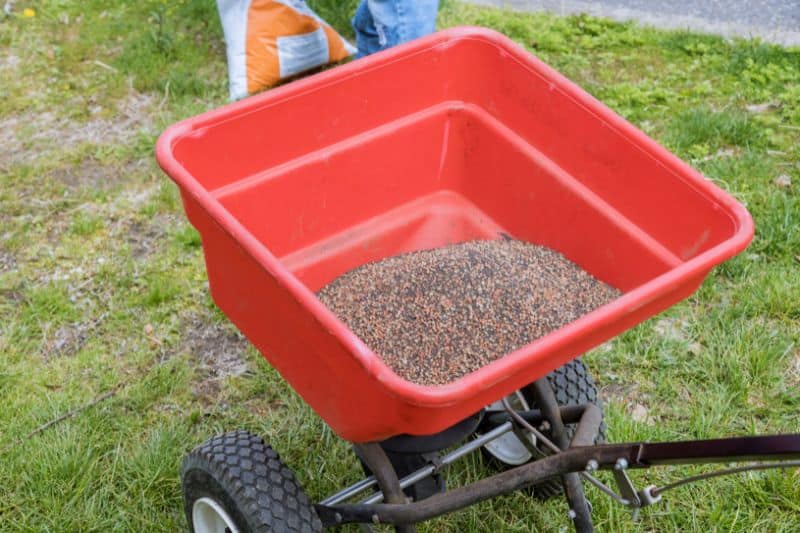There’s nothing like having a healthy, lush lawn on your landscape. If you’re just growing a fresh lawn or you’re doing a little reseeding, watering is the most vital care routine to start the seeds and keep them growing.
If you’ve taken the time and resources to seed your lawn, keep in mind that your watering pattern can be the difference between a healthy, thick lawn and dealing with bare spots.
So, it’s important to understand the water requirements of your grass seeds. But there are several factors involved, and this is why we’ve created a guide for grass seeds that answers all your pressing questions.
In this article, you’ll figure out how often you’ll need to water the grass seeds and how long it will take for your grass seed to germinate.
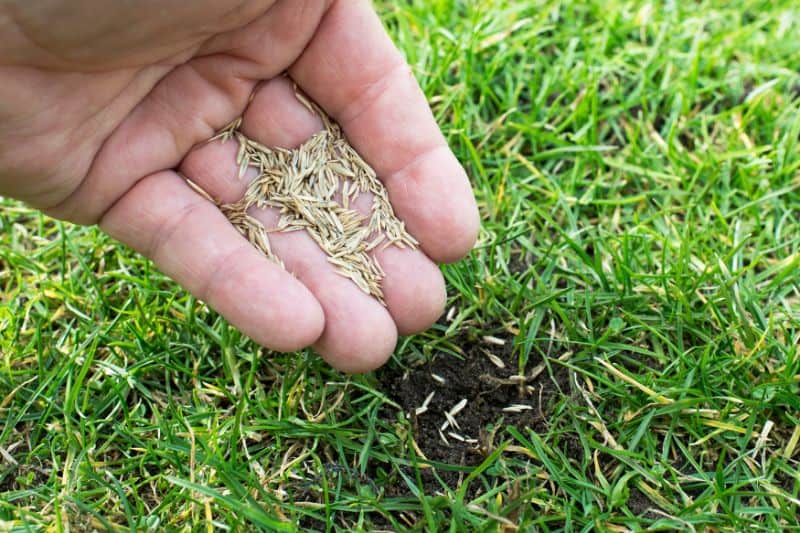
How Long Will Grass Seeds Live Without Water?
Grass seeds require moisture to germinate successfully. In favorable weather conditions, they can remain viable for a short period, but in hot and dry temperatures, the drying process accelerates, reducing the window of opportunity for successful germination.
In essence, the presence of adequate moisture is critical for the sprouting and growth of grass seeds, making it essential to ensure the right environmental conditions for a lush and healthy lawn.
Aside from weather conditions, other factors like seed type, growth stage, and soil type would also affect how long your grass seed can live without water.
Seed Type
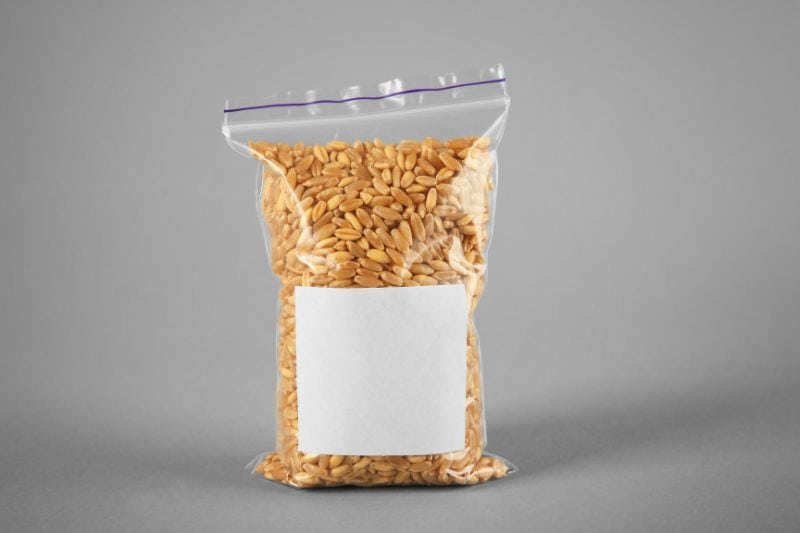
There are different varieties of grass seeds. The type you sow would determine how frequently the grass seeds would need water. Certain seeds go dormant for quite a long time before they sprout. These seed types can go without water for weeks and still sprout.
For varieties that don’t go dormant, frequent watering, especially each evening, is even more essential for their germination. But then, either way, regular watering would speed up the sprouting of the seeds, whether it’s the dormant type or not.
But before you choose the seeds to grow, ensure they are favorable for your prevalent weather conditions.
Soil Type
Your soil type would also determine how often you’d need to water your grass seed. If your soil retains water, your grass seeds can survive without water for a couple of days.
On the other hand, highly porous soil types tend to drain water too quickly and would, therefore, hardly go a day without water. So, it’ll be great for you to figure out your soil type and do what works for you.
Growth Stage
Grass seeds have varying water requirements at different stages of growth. If your grass seeds are dormant or just yet to sprout, they can live without water for a week. But when they start germinating, they’ll need water daily to help accelerate their growth process.
So it is recommended that you water your grass seed twice daily during germination, that is, in the morning and evening. For grass sprouts, the shoots can retain water, meaning they can go for a few days before they need watering.
How Often Should Grass Seed be Watered?
The frequency at which you should water your grass seed depends on the climatic condition of your region.
- If you live in a geographical area where the weather is cool and favorable, you can just water it two times daily. Just ensure that you don’t allow your seed grass to lack water for over 12 hours.
- However, if you live in an extremely dry area, water your grass seed at least 3-4 times a day to prevent it from drying. This is because when the temperature is too hot, it hastens drying out and can eventually lead to the death of the grass seed.
So all that is required is just 5 minutes of watering each time. By constant watering, your grass seed will be able to maintain a moderate level of wetness of about 20 inches deep, improving its absorption rate of moisture and nutrient level absorption.
The grass seed’s most delicate growth stage is germination, as it’s during this time the seed is at its weakest point, requiring a lot of water for rehydration and cell expansion.
If you don’t water it as often as possible at this stage, it is only a matter of a few days before you wake up and find it all dried out. Fortunately, watering the grass seed doesn’t demand much of your time, especially considering that it will have started to grow after 2-3 weeks.
How Long Can You Store Dry Seeds Before Planting Them?
You can store dry seeds for about two to three years before you plant them. Although some varieties can even be stored for 10 years, keep in mind that a small part of the seeds may lose viability.
Also, pay attention to the expiry date on the pack of the grass seeds. To store the grass seeds properly before you plant them, use an airtight container. Here are the steps to follow to ensure proper storage:
- Ensure the seeds are completely dried to the point of being brittle before packing them for storage.
- You can place the dried seeds in a paper envelope to absorb any moisture that might get in.
- Label the envelope with the name of the grass seed species and year to aid remembrance.
- Keep the envelopes in a cool and airtight container.
- Store the container in a very cool, dry, and dark place.
What Happens if You Forget to Water the Grass Seed?
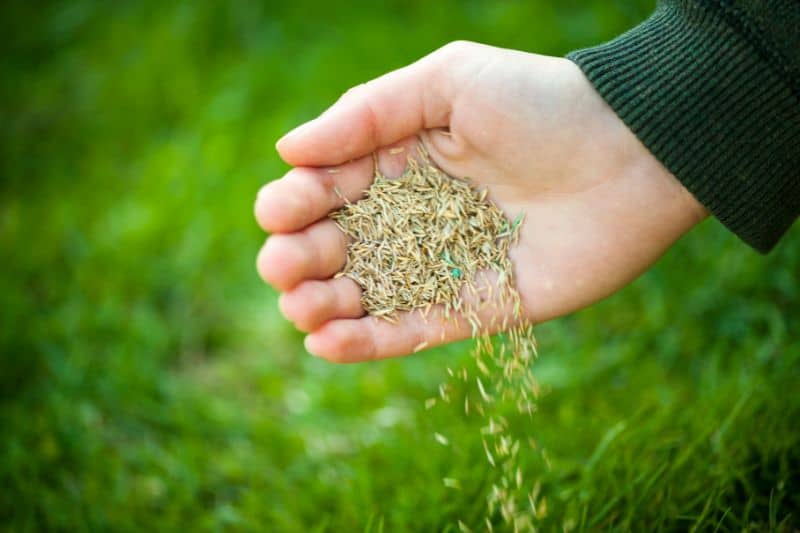
If you forget to water your grass seed consecutively for several days, then your grass seed will stop germinating and developing. Grass seeds need water to germinate, so if the seeds dry out while sprouting, the grass will stop growing.
You’ll need to create a favorable condition for your grass seeds to ensure successful sprouting. You can ensure your grass seeds always get sufficient water by using a timed sprinkler or scheduling your watering with a simple phone alarm. Ensure you cover the entire grass seeds and water them evenly instead of just soaking the soil.
If you’ve planted your grass seeds during the rainy season, you can skip watering for days if the soil is moist. It’s also very important to always check your soil, even on rainy days, to ensure that the seeds are getting enough moisture. This will help you avoid overwatering or underwatering the soil.
How Long Does Grass Seed Take to Germinate?
All grass seeds do not take the same amount of time to germinate. But generally, a typical grass seed takes about 5 to 21 days to germinate. Several factors affect how long your grass seed would take to germinate, such as the grass species, time of the year, weather or climatic conditions, soil moisture, etc.
To ensure faster and more successful germination of seeds, remember to select a seed type suitable to your local climate.

There are two major types of seeds:
- Warm-season grass seeds
- Cool-season grass seeds.
Cool-season grass seeds germinate much faster than warm-season grass. However, some grass seed mixes usually contain both kinds of grass. Carefully read the grass seed package instructions to determine the grass variety and requirements.
Grass varieties like buffalo, St. Augustine, Bermuda, and Bahia grass are warm-season varieties. Cool-season varieties, including perennial ryegrass, fescue, and Kentucky Bluegrass, would usually sprout in a week.
Here are some other activities you can carry out to ensure successful germination:
- Ensure you keep the soil always moist, but do not over-water it.
- The most appropriate time to sow your grass seed is in spring or autumn when the soil temperature is at least 8 degrees Celsius.
- You must not allow the soil to dry out until there is sufficient green growth where you sowed the grass seed.
- Ensure you use a high-quality seed mix and follow all instructions given on the packet on how to sow the seed.
- Finally, avoid sowing on a windy day because the wind can blow away your grass seed.
Will Grass Seed Grow Without Watering?
Just like most seeds, grass seeds can’t grow without water. Soil moisture is essential to start seeds and ensure their growth by providing oxygen, hydrogen, and nutrients to the grass seeds.
Watering ensures the germination of the grass seeds by soaking them till the moisture and moisture get to the embryo. Normally, the seeds would absorb the water until it gets to the embryo, and the embryo begins to grow until it sprouts and the roots grow.
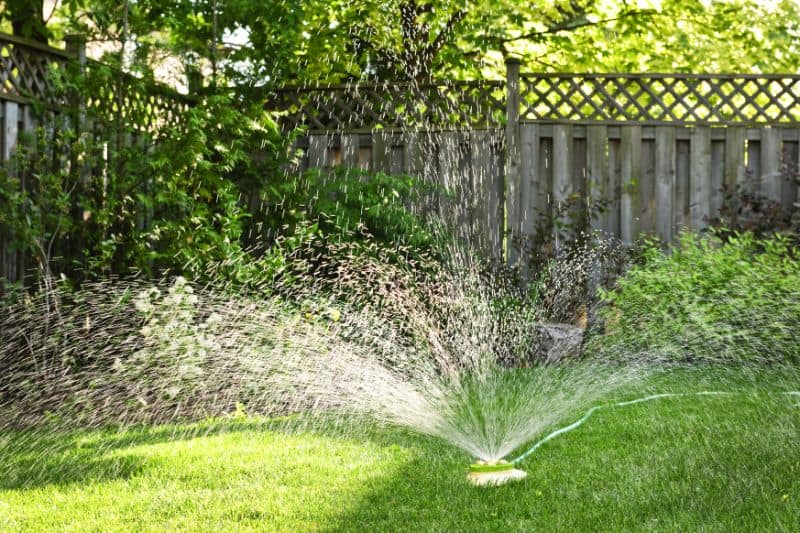
What Happens if I Miss a Day of Watering Grass Seed?
Most grass seeds will not die if you miss just a day of watering. After watering, the soil would likely still have some stored nutrients and water to keep it to the following day. If you’ve missed a day of watering, simply water it, as usual, the next day.
Missing a day of watering can make you panic badly. And if you suddenly remember at nighttime, you may want to make up for it by watering immediately. But then, don’t make it a habit to water your seeds at night, as it may attract fungal growth because the soil may not completely absorb the water.
Always make sure to water the grass seeds during the day or, at the latest, in the evening so the water is absorbed when the seed grass is active, and then sunlight would encourage the evaporation of any excess water.
